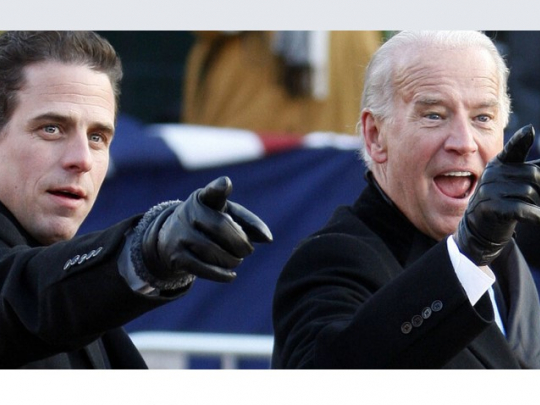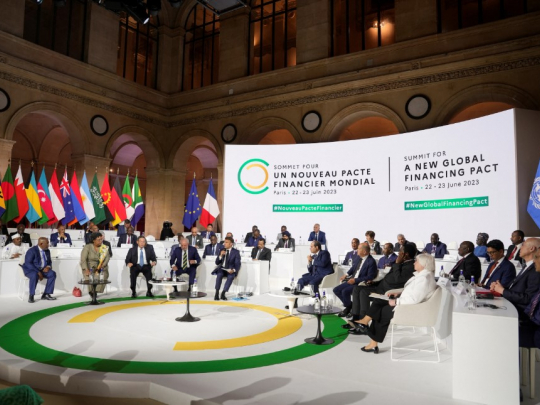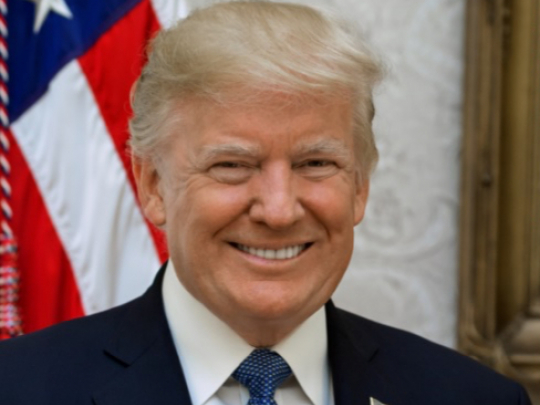Saudi Arabia Considers Accepting Yuan For Chinese Oil Sales Instead Of Dollars

 The dynamic between the US and Saudi Arabia seems to be dramatically changing. The petrodollar is showing cracks in what seemed to be an impregnable fortress as Saudi Arabia is now considering accepting the Yuan for Chinese oil sales instead of the dollar.
The dynamic between the US and Saudi Arabia seems to be dramatically changing. The petrodollar is showing cracks in what seemed to be an impregnable fortress as Saudi Arabia is now considering accepting the Yuan for Chinese oil sales instead of the dollar.
A worldwide financial structure predicated on the petrodollar – this was a realm wherein oil manufacturers would offer their goods to the US (and the world at large) for dollars, recycle the revenue in dollar-denominated holdings, and expressly help boost the USD as the global reserve monetary system whilst also making investments in dollar-denominated markets, and also set in concrete the position of the US as the undisputed financial superpower- was one of the fundamental staples of the past 40 years, and an anchor trying to prop up the dollar’s reserve status.
Those times are drawing to a close, according to reports from the Wall Street Journal.
Just a day after reports emerged that the “UK is asking Saudis for more oil even as MBS invites Xi Jinping to Riyadh to strengthen ties,” the WSJ publishes a bombshell report stating that “Saudi Arabia is in active talks with Beijing to price its some of its oil sales to China in yuan,” a step that could undermine not just the petrodollar’s supremacy of the worldwide petroleum market – something which Zoltan Pozsar managed to predict in his previous note – and it represent yet another pivot by the world’s biggest crude supplier toward Asia, as well as a maneuver targeted straight at the core of the US financial system, which has used the dollar’s reserve status to finance government expenditures for the past decade by printing as many dollars as necessary.
The negotiations with China concerning yuan-priced oil deals have been on and off for six years, according to the source, but have picked up this year when the Saudis have become progressively dissatisfied with decades-old US security obligations to protect the country.
The Saudis are angry over the U.S.’s lack of support for their intervention in the Yemen civil war, and over the Biden administration’s attempt to strike a deal with Iran over its nuclear program. Saudi officials have said they were shocked by the precipitous U.S. withdrawal from Afghanistan last year.
China purchases upwards of a quarter of Saudi Arabia’s oil exports, and if those purchases were denominated in yuan, they could strengthen the Chinese currency’s status and put it on a trajectory towards being a worldwide petroyuan reserve currency.
Even the Wall Street Journal acknowledges that switching to a (petro)yuan system “would be a profound shift for Saudi Arabia to price even some of its roughly 6.2 million barrels of day of crude exports in anything other than dollars,” because the vast bulk of worldwide oil sales—around 80%—are completed in dollars, and also the Saudis have sold oil purely in dollars since 1974, when they struck an agreement with the Nixon government that contained security assurances for the kingdom. The Saudis seem to have lost interest in US “security guarantees” and have switched their loyalty to China.
As a refresher, China established yuan-priced oil deals in March 2018 as part of its attempts to render its currency tradable globally, but they’ve not made an impact in the dollar’s domination of the oil sector, owing to the dollar’s continued supremacy as the currency of preference for oil exporters.
However, as Pozsar has pointed out, the usage of dollars has become a risk for China as a result of US sanctions on Iran over its nuclear program and on Russia in reaction to the special operation in Ukraine.
Today’s historic shift is not entirely unexpected: China has been courting Saudi Arabia in recent times, assisting the kingdom in developing its very own ballistic missiles, advising on a nuclear program, and making investments in Crown Prince Mohammed bin Salman’s vanity projects, including Neom, a futuristic new city.
Meanwhile, the US-Saudi cooperation has worsened under President Biden, who declared the country a “pariah” in the 2020 campaign after the assassination of Saudi journalist Jamal Khashoggi in 2018. Mr. Khashoggi’s murder was allegedly ordered by Prince Mohammed, who declined to participate in on a call between President Joe Biden and Saudi King Salman last month.
It also arises at a time when the United States’ economic relationship with Saudi Arabia is deteriorating: the United States is now one of the world’s top oil producing nations, a sharp shift from the 1990s, when it imported 2 million barrels of Saudi crude per day, but that number has dropped to less than 500,000 barrels per day in December 2021. China’s oil imports, on the other hand, have risen steadily over the previous three decades, in tandem with the country’s growing GDP.
As per statistics from China’s General Administration of Customs, Saudi Arabia was China’s top crude supplier in 2021, delivering 1.76 million barrels per day, trailed by Russia at 1.6 million barrels per day.
“The dynamics have dramatically changed. The U.S. relationship with the Saudis has changed, China is the world’s biggest crude importer and they are offering many lucrative incentives to the kingdom,” said a Saudi official familiar with the talks.
“China has been offering everything you could possibly imagine to the kingdom,” the official said.
In hindsight, we now understand why MBS didn’t answer Biden’s calls.
Obviously, the United States is not pleased with this monumental shift: a senior US source told the WSJ that the Saudis exporting oil to China in yuan is “highly volatile and aggressive,” and “not very likely.” The Saudis, according to the official, had proposed the concept in the past when Washington and Riyadh were at odds.
Of course, the Saudis could change their minds. Shifting millions of barrels of oil transactions from dollars to yuan on a daily basis might destabilize the Saudi economy, which has a tied currency, the riyal, to the dollar.
Prince Mohammed’s advisers have warned him that if he proceeds with the plan too quickly, he will face unforeseeable economic consequences. Perhaps Saudi Arabia is simply bracing for the day the anchor will be severed, cutting the last significant link to the United States.
Doing more transactions in yuan would bring Saudi Arabia closer to China’s currency, which hasn’t caught on with overseas investors due to Beijing’s stringent regulations. Reduced oil sales in a far less stable currency may further endanger the Saudi government’s fiscal outlook.
According to the WSJ, the influence on the Saudi economy will be determined by the amount of oil sold and the price of oil. Departing from dollar-denominated oil sales, according to some economists, would broaden the kingdom’s revenue base and might ultimately lead to the riyal being pegged to a basket of currencies, akin to Kuwait’s dinar.
“If it is (done) now at a time of strong oil prices, it would not be seen negatively. It would be more seen as deepening ties with China,” said Monica Malik, chief economist at Abu Dhabi Commercial Bank.
Nonetheless, the Saudis intend to conduct the majority of their oil dealings in dollars, but the shift has commenced, and the initiative may persuade other suppliers to price their Chinese supplies in yuan as well. Russia, Angola, and Iraq are China’s other major oil suppliers.
“The oil market, and by extension the entire global commodities market, is the insurance policy of the dollar’s reserve currency status,” said economist Gal Luft, co-director of the Washington-based Institute for the Analysis of Global Security and co-author of a book on de-dollarization. “If that block is taken out of the wall, the wall will begin to collapse.”
Last week, none other than former New York Fed staffer Zoltan Pozsar resurrected the idea of a new global reserve currency, writing in his recent must read note that “when this crisis (and war) is over, the U.S. dollar should be much weaker and, on the flipside, the renminbi much stronger, backed by a basket of commodities.
From the Bretton Woods era backed by gold bullion, to Bretton Woods II backed by inside money (Treasuries with un-hedgeable confiscation risks), to Bretton Woods III backed by outside money (gold bullion and other commodities).”
As a result, the pieces of the endgame are starting to click: Russia deprives the western world of much-needed assets, driving resource rates ever higher, while China silently starts picking up the financial bits and takes full advantage of the Western tussle to secure resources at any and all costs, approaching all those other “non-western” former petrodollar clients – who also are rich in other resources – to provide them a new product, the yuan, which Beijing is now aggressively trying to dethrone the dollar as a global reserve currency.
- Source : GreatGameIndia



















